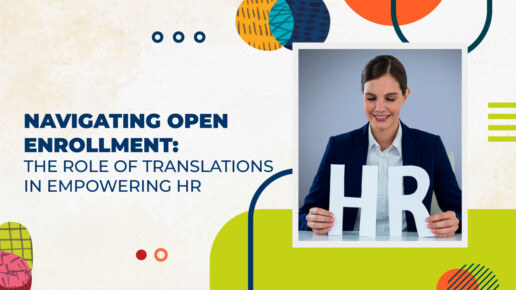Navigating Open Enrollment: The Role of Translations in Empowering HR
In the dynamic world of Human Resources (HR), Open Enrollment is a pivotal period that demands meticulous planning and effective communication. During this time, employees have the opportunity to make crucial decisions about their benefits, from healthcare coverage to retirement plans. However, the diverse workforce that characterizes today’s organizations brings with it a wide range of languages and cultures, which can pose significant communication challenges.
In this article, we will explore the importance of translations in HR during the Open Enrollment period. We’ll delve into the benefits of clear and inclusive communication and discuss how professional translation services can empower HR teams to ensure that every employee is well-informed and supported throughout this critical process.
The Multifaceted Challenge of Open Enrollment
Open Enrollment is a complex and multifaceted process that encompasses a range of benefits, policies, and procedures. Employees need to understand the nuances of different healthcare plans, evaluate retirement options, and make choices that align with their unique needs and circumstances. This process is further complicated by:
Diverse Workforces: In today’s globalized world, many organizations have diverse workforces with employees who speak a variety of languages. Ensuring that information is accessible to everyone can be a significant challenge.
Legal Compliance: HR teams must also navigate the legal requirements associated with Open Enrollment, including providing information in a manner that is compliant with regulations such as the Affordable Care Act (ACA).
Complex Terminology: The benefits industry is replete with complex terminology and jargon, making it difficult for employees to understand the details of their options fully.
Employee Engagement: Engaging employees in the Open Enrollment process is essential to ensuring that they make informed decisions. Effective communication is the key to this engagement.
The Role of Translations in HR
Effective communication during Open Enrollment is critical to support employees in making the best choices for their individual situations. Here’s how translations play a crucial role:
Accessibility: Translations make benefits information accessible to employees who may not be proficient in the primary language of communication. This ensures that everyone has an equal opportunity to understand and select their benefits.
Inclusivity: Inclusive communication demonstrates a commitment to diversity and inclusion within the organization. It shows that the company values all employees, regardless of their language or cultural background.
Compliance: Many regulations, such as the ACA, require that certain information be provided in multiple languages. Translations help HR teams meet these legal obligations.
Clarity: Translating benefits information reduces the risk of misunderstandings and misinterpretations, helping employees make informed decisions and reducing the likelihood of disputes later on.
The Benefits of Professional Translation Services
While the importance of translations in HR during Open Enrollment is clear, not all translations are created equal. Professional translation services offer distinct advantages, including:
Accuracy: Professional translators are well-versed in industry-specific terminology, ensuring that translations are precise and error-free.
Cultural Sensitivity: Translations extend beyond words; they must capture cultural nuances and context. Professional translators understand these subtleties.
Confidentiality: HR deals with sensitive employee information. Professional translation services adhere to strict confidentiality standards, ensuring that data remains secure.
Efficiency: Translating complex benefits information is a time-consuming task. Professional translation services can streamline the process, ensuring that materials are ready when needed.
Best Practices for HR in Open Enrollment Translations
To harness the full potential of translations in HR during Open Enrollment, consider implementing these best practices:
Plan Ahead: Begin the translation process well in advance of the Open Enrollment period to ensure that materials are ready for distribution on time.
Consult Employees: Gather feedback from employees who speak different languages to understand their specific needs and preferences for translations.
Offer Multiple Formats: Provide translations in various formats, such as written documents, online resources, and in-person support, to accommodate diverse learning styles.
Training and Support: Ensure that HR staff and managers are equipped to answer questions and provide support in multiple languages.
Feedback Mechanisms: Establish mechanisms for employees to provide feedback on the quality and clarity of translations.
Conclusion: Empowering HR Through Translations
In the modern workplace, diversity is an asset, but it also presents communication challenges that HR teams must address effectively. Open Enrollment is a prime example of a critical HR process where clear and inclusive communication can make a significant difference in employee satisfaction and engagement.
Professional translation services are not just a tool for compliance; they are a means to empower HR to connect with all employees, irrespective of their linguistic backgrounds. By prioritizing translations in HR during Open Enrollment, organizations can build a stronger, more inclusive workforce that is better equipped to make informed decisions about their benefits.
In an era where effective HR practices are a key driver of organizational success, embracing translations is not just an option—it’s a strategic imperative for companies committed to fostering diversity, inclusion, and employee well-being.

